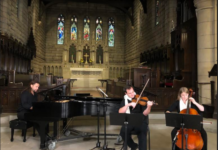LAWRENCE – A research project at the University of Kansas will create a digital archive of World War I poetry that captures the wide-ranging sentiments of American immigrants, including those who found themselves living in a country headed to war with their homeland.
For the past six months, KU students have been identifying, encoding, transcribing and annotating poetry about World War I written by American immigrants, particularly those from Germany. So far the project includes more than 300 poems.
“For German immigrants in America, their heritage overseas and their identity as Americans came into conflict,” said Andrew Crist, a senior in economics and math who is part of the team researching World War I poetry. “These are timeless questions. Even the immigrant question today reflects some of the issues we see in this poetry.”
Tied to the 100th anniversary of World War I, the digital archive project is a collaboration between KU and Kansas State University. The KU team is supported by a seed grant through the KU Institute for Digital Research in the Humanities. The archive will include American poetry and poetry written by other immigrant groups as well, such as Mexican-Americans.
“World War I has long been in the shadows of World War II. This is part of an effort to demonstrate why World War I is relevant for us today,” said project leader Lorie Vanchena, associate professor of German and academic director of the European Studies Program.
The digital archive of American World War I poetry will fill a gap in World War I scholarship, Vanchena said. Eventually the poems will be available online, so academics, teachers, students and the general public can access them. The digitized poems will include contextual information for historical, cultural and political references.
While “In Flanders Fields” is perhaps the most well-known poem about World War I, poems were frequently published in newsletters, newspapers, journals and books during the war years. Studying them today provides a more nuanced view of how the war touched everyday lives, the student researchers said.
“In the history courses I have taken in the past, we have learned about the mechanics of war, the soldiers and the politics involved,” said Caelan Graham, a sophomore in environmental studies and European studies who is also studying for a minor in German. “But this project has allowed a glimpse into how the war affected everyone.”
Among the immigrants most affected by the war were German-Americans.
“As an ally of Britain, Americans looked down on the German-Americans, which is interesting because today if you have German heritage it is a very celebrated thing,” said Janelle Fox, a senior in history and Latin American & Caribbean studies.
In the 1880s, the United States had a mass migration of immigrants from German-speaking lands. By 1910 about 2.3 million German-born immigrants lived in the United States.
“You had Germans here who had strong sympathies for their homeland, often because they still had family back in Europe and German-Americans loyal to their new homeland who returned to Europe to fight against those who hadn’t migrated,” Vanchena said. “We are seeing poetry along all points of that political, historical and immigrant spectrum.”
So far, much of the poetry identified has come from German and German-American newspapers and newsletters that were published in the 1910s and housed at KU’s Max Kade Center for German-American Studies, which has a long tradition of research on German-American exile literature.
Some of the poetry expresses pro-German and anti-British sentiment, such as “English Kultur,” a poem that points to the hypocrisy of the English notion of the barbaric German. Others are pro-American, neutral or anti-war, such as a poem by a wounded German soldier who spent time at an Allied medical camp. In it, he writes that for the people on the ground, there was no quarrel.
“These short little poignant poems can really get the point across effectively,” Crist said.





